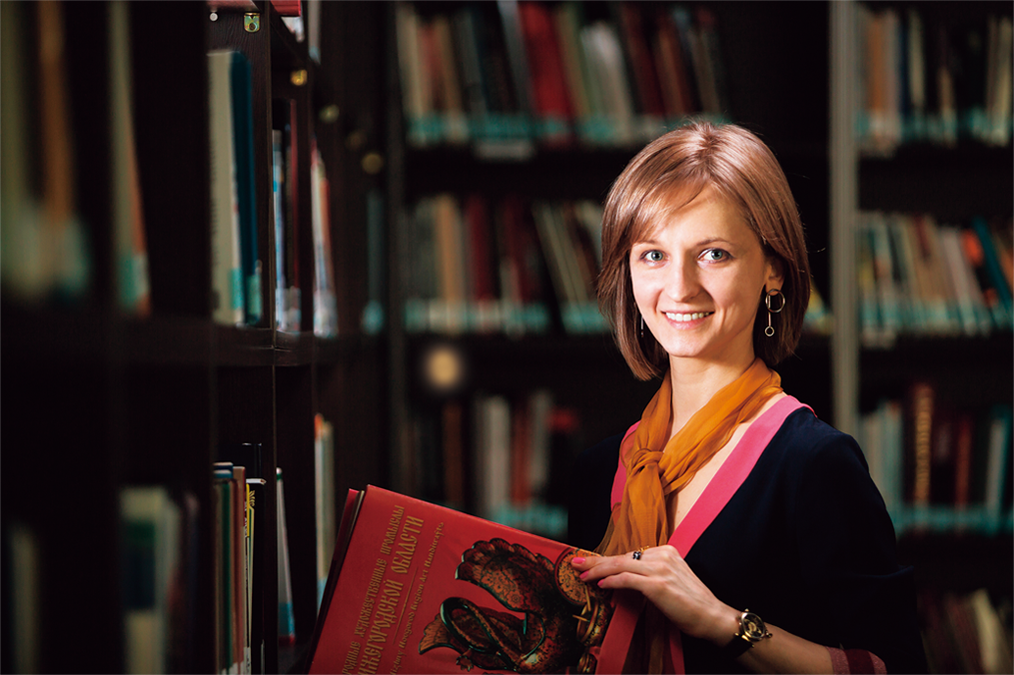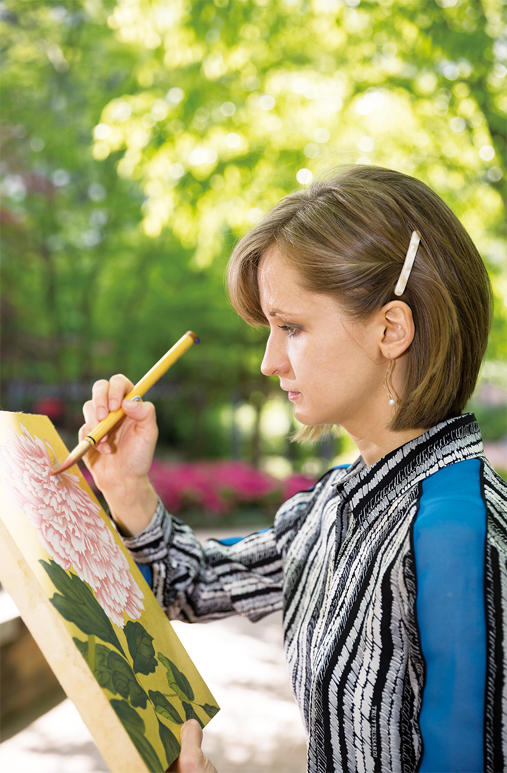Professor Irina Korgun, a Seoul resident for eight years now, often takes the subway. As a researcher ofthe Korean economy, she finds it the perfect place to observe the vigorous lives of Korean people. One day,she hopes to work for an international organization as a Korean economy specialist.

After serving as a research professor at the Institute of Russian Studies at Hankuk University of Foreign Studies since 2011, Irina Korgun was appointed assistant professor of the Russian language department at the same school last year.
Professor Irina Korgun appeared in front of the main building of Hankuk University of Foreign Studies at the exact appointed time. Perhaps it was due to her petite figure, but she hardly stood out in a crowd of Korean students and faculty. She held a vitamin drink in one hand, which a student had given her in a previous class.“He just finished his military service. Russian professors are very authoritative, but I find the professor-student relationship in Korean universities to be much closer. In Korea, professors have to be good teachers of course, but they also provide personal and academic guidance,” she says.
Field-based and People-oriented Research
Korgun had served as a research professor at the Institute of Russian Studies at Hankuk University of Foreign Studies for four years before she was appointed last year as an assistant professor in the school’s Russian language department. Now in her second semester, she is teaching advanced Russian using mostly economic texts.
“Graduate students who are writing dissertations related to the Korean and Russian economies, as well as students who want to study in Russia, come to me for help or to ask questions. Graduates of the Russian language department have the highest employment rate at HUFS,” she says, beaming with satisfaction.
Her office is filled with ornaments featuring images of Chekhov, Tolstoy, Dostoevsky, and Pushkin. She notes that Koreans’ love for Russian literature is surprisingly deep, mentioning that her favorite book is “The Brothers Karamazov.”
“Koreans relate to Russian literature because both Koreans and Russians share the sentiment of han, or deep sorrow. American literature is rooted in optimism, whereas Russian and Korean literature is based on sadness,” she says.
As another similarity between the two peoples, Pro
fessor Korgun pointed out kimchi. After the fall harvest, Russians also pickle their cabbage, which is often used to cook a hearty cabbage soup called shchi.Quite uncommon for a Russian, Korgun majored in the Korean economy. She was studying East Asian economies when she wasespecially drawn to Korea, which had grown rapidly on the back of its export-oriented policies. She went on to write her doctorate thesis at Saint Petersburg State University in 2010.“Korea’s economic growth and development is an interesting topic in many ways. Much research has already been done by Korean economists, but I consider foreigners’ research just as important. There must be differences between internal and external views,” she says. Professor Korgun is currently studying the role of foreign aid in Korea’s economic development and the Koreans’ attitude and response as aid recipients. Her area of interest also includes Japan’s influence on Korea’s economic development. For example, the Japanese built railways during their occupation of Korea in the early half of the 20th century, and she is studying whether this benefited or harmed Korea.
On the day of our interview she was adding the final touches to the Korean section of a book about Russia-bound foreign direct investment, two days before the deadline. The British publisher Routledge had signed up with five experts on each country for the book, which is scheduled to be published in November this year.
As an economist, Professor Korgun’s research methods are based on sociocultural observation. This sets her work apart from other Russian papers which are mainly based on written materials. She looks at the Korean economy through the lens of “place” and “people” as she conducts her research here in Korea, in the Korean language, among Korean economists. Korgun takes the subway to observe people. She laughs to herself about her habit of slyly peeking at text messages of passengers sitting next to her. She finds clues to understanding Korea from the text messages people exchange with family members, as well as store signboards and the culture centers of department stores. She writes columns for a Korean daily from time to time, and her observations and experiences about Koreans’ anti-Japanese sentiments, anti-chaebol attitudes, perceptions of China and the United States, the power of the Korean Wave, and Korea-Russia economic cooperation come mainly from her interaction with the people around her. She is always prepared with ways to break the ice and start a conversation. In the same vein, she has never turned down an offer to preside over the Russian language debate contest hosted by HUFS every year.
“I know Koreans do not like chaebol much,” she observes. “But I am interested in how they run their department stores. There is a small gallery at Lotte Department Store in Myeong-dong. It felt rather classy to see an exhibition there, a show of prints by Spanish artists including Picasso. Department stores have culture centers that offer free or affordable concerts and classes. Their ultimate goal is to lure in more customers, but I could detect a certainrespect for people. I see more community centers, libraries, and welfare facilities for the physically challenged and the elderly today, as compared to when I first came to Korea.”
Dedication to Studying Korean
Professor Korgun loves Seoul, especially the city on weekends. “It feels like Moscow or Paris when I am drinking coffee in a downtown café in Seoul on the weekend. I can easily enjoy Russian ballet and performances by famous orchestras here in this city. When I ride a cab, the taxi drivers play Rachmaninov or Tchaikovsky for me. How can I not love Seoul?” she says.
It was Christmas evening in 2003 when she first set foot in this country to learn Korean at Yonsei University’s Korean Language Institute. She recalls: “It was a beautiful day. The whole world looked like it was a brightly lit Christmas tree. I walked around the downtown area mingling with the crowd and bought myself a Baskin Robbins ice cream. That was the first time I had ever tried that ice cream.”
From then until 2007, she came back every vacation to enroll in Korean classes. In 2007, she received a research grant from the Korea Foundation and stayed here for a year while preparing her doctorate dissertation. Around the time she received her degree, she noticed a job offer at the Institute of Russian Studies at the Hankuk University of Foreign Studies for two research professors— one American and one Russian. In 2011, she applied and was selected for the post.
“The Russian language has a sentence structure that is directly opposite from Korean. In Korean, the verb comes last. I had to completely change the linguistic rules that were in my head and start from basic grammar. The honorifics were the hardest part,” she says.
Now almost fluent, she adds, “I think I was able to learn Korean better because there were no other Russians to talk to. I also had to get used to the sophisticated language that the Korean researchers were using.”
An Economist in Love with Folk Painting

In her spare time Professor Korgun takes classes in traditional Korean folk painting. She recently took part in an exhibition with five of her own works.
Korgun was raised by architect parents. She was a bright studentwho loved art, music, and ballet. She devoted herself to herstudies in junior and senior high school, even receiving privatetutoring. Now, her English is a bit better than her Korean and she isalso learning Chinese.
She defines herself as someone who is constantly on the move:“To me, going places is very important. Taking a walk, traveling, flyingon a plane — that is me.”
Korgun has lived in Korea for eight years now. She has spentfour months in Japan and seven months in the UK as a researcher.She says her “nomadic fate” is written in her saju, or the “four pillarsof destiny” used in traditional Korean fortunetelling.
She had her fortune read after she applied for a research positionin Paris and London in 2013. She sought out a famous fortuneteller,who said it was her destiny to “live like flowing water,” movingfrom one place to another, all her life. She was also told that economicssuits her well. “I couldn’t agree more. The more I study, themore interesting economics is,” she says.
For Korgun, one of the joys of living in Korea is folk painting. Sheloves traditional motifs like the crane and lotus flower. Probably dueto the influence of her architect parents, she developed an interestin color from a very young age. She has attended Korean traditionalpainting classes in Gangnam and produced five large works, whichhave been exhibited. One of her paintings was framed and shippedto her advisor at Saint Petersburg State University. She also senther works to her mother and sister. Another is hanging in her homein Seoul.
The day I met Professor Korgun was March 5, three days beforeWorld Women’s Day. She notes that the way World Women’s Day iscelebrated distinguishes capitalist nations from socialist ones. Inother words, socialist societies tend to place a lot of importance onthe day whereas capitalist societies do not. She showed me congratulatorymessages she had received from home that morning,saying, “I am happy to be born a woman.”
“Since the Revolution, hardly any Russian women stay at homeas full-time housewives. We often see female plant managers atfactories producing machinery. My mother went to work all her life.I remember how I used to wait at kindergarten for my mother topick me up after work.”
Professor Korgun believes that Korean women have a lowersocial status than their Russian counterparts. Smiling, she notes,“Almost all the participants at most academic conferences aremen.”
“It feels like Moscow or Paris when I am drinking coffee in a downtown café in Seoul on the weekend. Ican easily enjoy Russian ballet and performances by famous orchestras here in this city. When I ride acab, the taxi drivers play Rachmaninov or Tchaikovsky for me. How can I not love Seoul?”
As a keen observer of Korea-Russia economic cooperation witha researcher’s perspective, I wondered how she estimated the viabilityof the plans to build a trans-Siberian gas pipe that connectsto Korea. She was skeptical: “Trade volume is down because of theweak ruble. Korea-Russia energy cooperation has lost steam. Outof Korea’s total gas imports, Russia only accounts for 4 percent. Itis because each party has a completely different agenda in bilateralenergy cooperation. I think bilateral trade should move away fromgas toward construction and medicine.”
With a disclaimer that “the possibilities are low,” she says thatone day she wants to work as a Korean economy specialist in aninternational organization like the UN, OECD, or UNCTAD. Then,laughing, she asks, “There are so many Korean economy expertswho are Korean. What are the odds of recruiting a Korean economyexpert from Russia?”